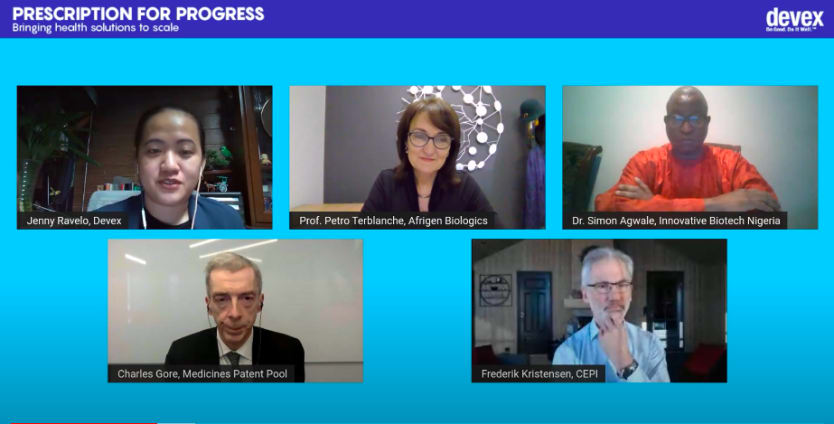
Partnerships have been key in producing the first messenger RNA COVID-19 vaccine in Africa and getting the vaccine approved and into people’s arms will require a similar effort.
In January, the first mRNA technology transfer hub in South Africa successfully produced an mRNA COVID-19 vaccine. It was able to replicate Moderna’s COVID-19 vaccine without the company’s assistance, by using publicly available information and support from international organizations and researchers in South Africa and from different parts of the globe.
But there’s still a long way to go before the vaccine can be administered to people.
“There [are] still some technological challenges for the team, but again, through partnerships, we will overcome that,” said Petro Terblanche, managing director at Afrigen Biologics, during an online panel discussion on Tuesday as part of Prescription for Progress 2022.
Challenges in the broader ecosystem — such as ensuring that the vaccines are taken up in the market, that the so-called spokes or companies that have expressed interest in learning from the hub are able to “absorb the technology” and produce at set quality standards, and that they are administered to people — will also require “significant collaboration,” according to Terblanche.
“We've spent so much time on the technological innovations and production of vaccines. But what really matters is that last mile to get this to people,” she added.
The hub, which was established in July 2021, is set up to help build the capacity of low- and middle-income countries in producing mRNA vaccines, a move that was born out of a realization during the pandemic on the need to build these capacities regionally or locally. During the COVID-19 pandemic, Africa has relied externally for its vaccines, which has been problematic as higher-income countries hoarded limited supplies.
The must-read weekly newsletter for exclusive global health news and insider insights.
Terblanche said not receiving a tech transfer is “a blessing in disguise,” as it allowed their scientists to innovate and learn the “basic building blocks” that would help them develop other mRNA-based vaccines.
Charles Gore, executive director at the Medicines Patent Pool, a partner in the hub, said lack of input from the originator company “makes it a little more difficult.” But he also said, “in some respects, this is a better way to go.”
“If Moderna had come to us right at the beginning and said, ‘here is our vaccine, here's how to make it,’ Afrigen would know how to make Moderna’s COVID-19 vaccine. Fantastic. However, not necessarily hugely helpful for the future in how to use the mRNA platform, for example, to make an HIV vaccine, or to make a TB vaccine — something that will ensure that this is a sustainable program. And furthermore, also to be ready for the next pandemic,” he said.
“We are perhaps losing a bit of time upfront, but potentially gaining a lot of experience that will be really useful further downstream,” he added.
He said they will continue to discuss with Moderna regarding a potential voluntary licensing agreement down the road, but don’t see any issues if that doesn’t happen.
“Afrigen is working on a second-generation vaccine that is what ultimately will go to market, using technologies that hopefully will be more suitable for vaccines for low- and middle-income countries. For example, using less or different raw materials because there is the potential for raw material shortage, being able to produce at lower cost … and then finally thermal stability, requiring ultra cold chain that these vaccines do at the moment is far from ideal,” Gore said.
“So this new vaccine, second generation … the idea will be that it will … have freedom to operate. It won't be bound by any patents,” he added.
Building manufacturing sustainability
The issue of sustainability was a central topic of discussion. Frederick Kristensen, deputy CEO at Coalition for Epidemic Preparedness Innovations, said there’s a clear need for facilities to continue functioning even during the “nonpandemic or interepidemic periods, and being kept warm.” These facilities could produce vaccines such as for Lassa fever, or yellow fever, which is a virus endemic in tropical areas of Africa, and Central and South America. But being able to “pivot, when needed” would be important.
He said CEPI can support facilities in finding new ways of “having smaller footprint, cheaper, more efficient production facilities.”
Meanwhile, instead of building huge facilities to produce 4 billion to 5 billion doses of vaccines, Terblanche believes the continent could build seven or eight “smaller, bankable, sustainable facilities” that are able to produce 1.3 billion or 1.4 billion vaccine doses beyond COVID-19. Building the continent’s regulatory systems and clinical trial capabilities, and aligning it with the needs in the market, will also help sustain Africa’s vaccine manufacturing sector.
Terblanche said one of the important things the mRNA technology transfer hub is doing is building the capacity for clinical trial manufacturing.
“There is no facility on the African continent that is licensed to produce clinical trial material. The facility here at the hub is designed to do exactly that,” she said, adding that Africa’s clinical trial capabilities need to be aligned with the 22 products the Partnership for African Vaccine Manufacturing has identified as a priority for localized production.
“We are perhaps losing a bit of time upfront, but potentially gaining a lot of experience that will be really useful further downstream.”
— Charles Gore, executive director, Medicines Patent PoolThat includes vaccines for “legacy diseases,” such as measles and cholera, and for “outbreak diseases” such as Ebola and “Disease X,” the World Health Organization’s nickname for an unknown future threat. It also covers diseases for which there are no vaccines yet out in the market, such as HIV, or available products have “relatively higher prices,” according to a document seen by Devex.
Simon Agwale, CEO at Innovative Biotech, which has also entered into partnerships to build the first vaccine manufacturing facility in Nigeria aimed at producing a COVID-19 vaccine using virus-like particle technology, underscored the need for the continent to build the full end-to-end manufacturing capacity for vaccines that affect its population, including manufacturing drug substances, and not just be limited to fill-and-finish operations, which he said currently covers almost 80% of the manufacturing in Africa.
“For sustainability, we must start focusing on upstream drug substance. If not, at the end of the day, we'll have empty fill-finish facilities throughout the continent without the drug substance to fill,” he said.









